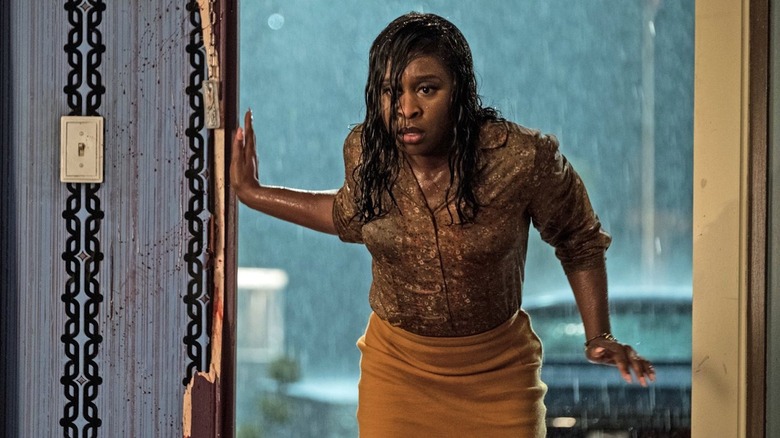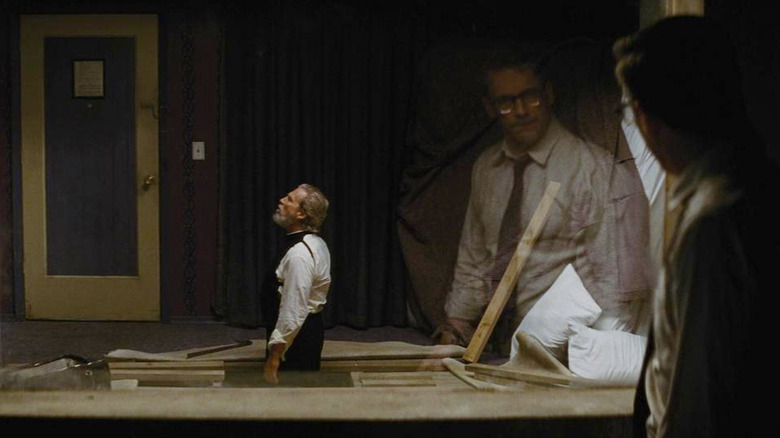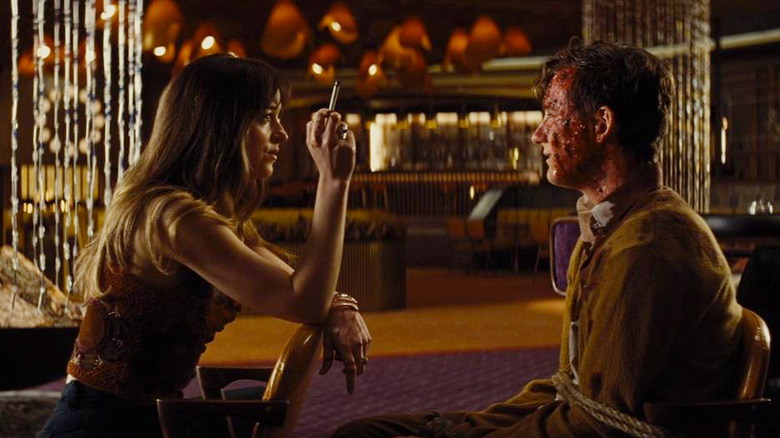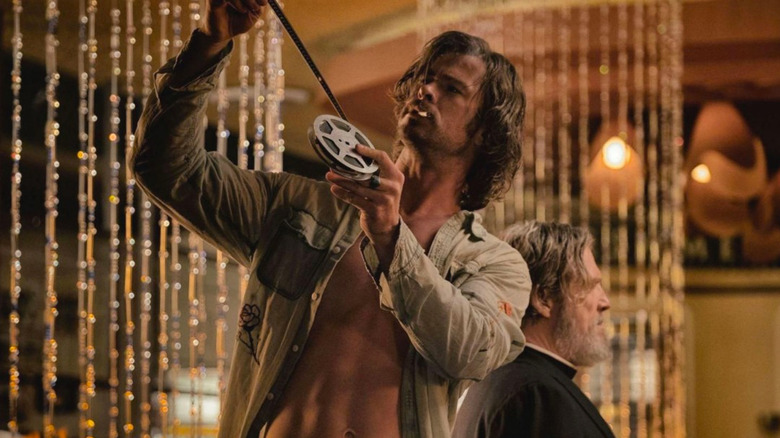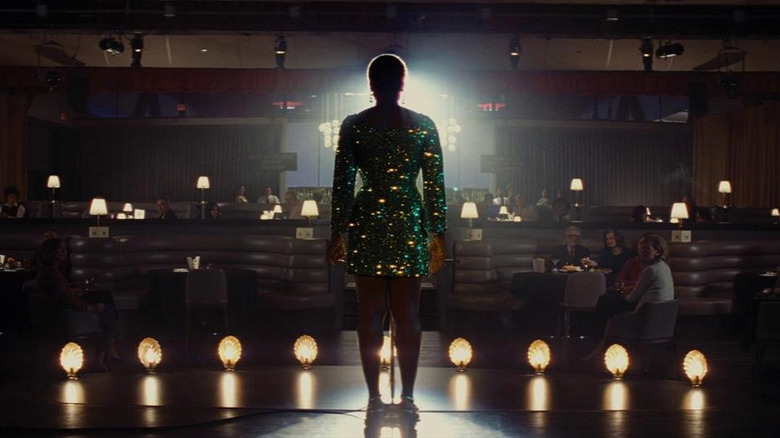Bad Times At The El Royale Ending Explained: The Misdirection Of Morality
Seven strangers all harboring a secret descend on a hotel for one bloody, eventful night. It's the kind of premise that's fueled many a hard-boiled noir, one that continues to inspire pastiche filmmakers today. "Bad Times at the El Royale" director Drew Goddard spun an incredibly nuanced web out of this simple conceit, using it to comment on a myriad of themes that dominated the 1960s. Faith, morality, surveillance culture, the rise of cult mentality, bigotry, misogynoir, America's abandoned veterans ... it's all there, strung together with help from Goddard's ensemble.
"Bad Times" begins with singer Darlene Sweet (Cynthia Erivo), priest Daniel Flynn (Jeff Bridges), vacuum cleaner salesman Laramie Seymour Sullivan (Jon Hamm) and hippie Emily Summerspring (Dakota Johnson) checking into the El Royale. The hotel's cheeky "bi-state" gimmick (it straddles the Nevada/California border), as well as its relative remoteness, once made it a haven for high-rollers looking to hide away. That in turn made their private lives ripe for surreptitious meddling. As most of the ensemble learns, an observation corridor runs behind every room in the El Royale. Two-way mirrors are installed in each room, serving as a window for El Royale management to record their guests.
Sullivan — who is actually FBI agent Dwight Broadbeck — is the first to discover the second level of the hotel. After snatching the master key from the front desk, Broadbeck discovers the El Royale's bellhop/bartender/housekeeper Miles (Lewis Pullman) passed out after taking a dose of heroin. In the hidden hallway, he sees Darlene practicing a song, peeks in on Father Flynn — who's torn the floorboards up in his room — and watches in horror as Emily drags an unconscious young woman into hers.
What kind of hotel is this? That question points us toward what's actually going on inside these rooms.
The money
To begin with, Father Flynn is actually not a priest at all, but a formerly-incarcerated thief named Dock O'Kelly. Ten years before that fateful night at the El Royale, he robbed a bank with his brother Felix (Nick Offerman) and another man, Larsen (Mark O'Brien). Unfortunately, the heist went south, which forced the trio to split up and reunite at the El Royale. Felix is the first to arrive. He checks into Room 4, takes the money, and buries it under the floorboards. Shortly after, Larsen arrives, kills Felix, and later testifies against Dock in court, sending him to jail.
Almost a decade later, Dock is out on parole, and he hasn't forgotten about the money — though his chronic (and worsening) recall issues will make it difficult to recover. He returns to the hotel in the guise of a Catholic priest, but he can't remember which room Felix hid the money in. He books Room 5 on a hunch, while Darlene takes Room 4. Dock is eventually able to convince Darlene to help him, but not before going on a bit of a detour with Miles.
For all the volatile, colorful characters at the El Royale, Miles is without a doubt the wild card. He's an unassuming guy with an obviously tragic past, and a lifetime of sins that he wants desperately to expunge. It turns out that he served in Vietnam as a sniper, and remembers every life he took. That war, and his shady dealings at the El Royale, haunt him constantly, and he frequently turns to opioids in order to numb the pain. When he first encounters Dock, he naturally assumes he's a man of the cloth, and immediately confesses his sins ... starting with the creepy corridor.
The cult
Through Miles, Dock learns about the El Royale's ulterior purpose: the staff would regularly record their guests — the more famous, the better — and their intimate encounters. Miles usually sends the rolls of film to management without fail, but he admits to keeping one film in particular because the guest (who remains nameless) was so kind to him.
Dock immediately sets out to find the film. If he can't get the cash out of Darlene's room, the footage will turn up a pretty penny somewhere. Meanwhile, Miles stumbles upon the situation unfolding in Emily's room. The unconscious young woman she's tied to a chair is actually her young sister, Rose (Cailee Spaeny) — and while her methods may seem intense, she's really just trying to save her from a charismatic cult leader by the name of Billy Lee (Chris Hemsworth). She's been protecting Rose their whole lives, first from their abusive father, who Rose adored despite his monstrousness. But when their father passed, Rose high-tailed it to California, where she immediately fell in with Billy.
Rose's rescue is interrupted by Agent Broadbeck (Jon Hamm), who naturally assumes that something shady is going on in Emily's room. He forces his way in and attempts to rescue Rose himself, but Emily, armed with a shotgun, kills him before he can — and the scattered buckshot also shatters their two-way mirror. Emily climbs into the observation hallway to interrogate Miles, which leaves Rose free to call Billy Lee and give him her exact location.
The tape
A reunited Dock and Darlene team up to retrieve the money from Room 4, but they're caught by Billy and his goons before they can make off with it. Billy rounds up the surviving patrons — that's Dock, Darlene, Emily and Miles — to figure out exactly what's going on ... and then, of course, kill them one by one. Billy is obsessed with two things: the illusion of choice, and of course, control. He resents Emily for stealing what "belongs" to him, so she is the first to die. Darlene becomes the next target of his ire, but it's more because of her disinterest in him and the tape he discovers in Dock's pocket.
"Don't you even wanna see who's in it?" he asks Darlene, a question that seems to tempt Goddard's curious audience as well. "Bad Times" goes to great lengths to tease out the mystery of the film. There are a few clues strewn throughout the film, and it's easy to guess who Goddard is actually alluding to. But does his identity actually matter? Does the tape itself contribute anything to the story? Yes ... but also no.
In "Bad Times," the action doesn't matter nearly as much as the ideas behind it all. Goddard is using the kerfuffle to comment on how trivial this aspect of the '60s really was. The posturing, the paranoia, the utter lack of privacy: it's all a breathless distraction from the stuff that actually matters. While people like Broadbeck and Billy squabble over a dead man's legacy, people like Miles, Rose, Dock, and Darlene slip through the cracks. Miles has done unspeakable things in a morally reprehensible war, but he's the only one paying for his part in it all these years later. And despite Emily's best efforts, Rose is manipulated at every turn. Darlene and Dock's respective plights are a bit more literal: a Black woman struggling for dignity in 1960s America and a felon with dementia don't have many options until a suitcase full of cash falls into their laps.
The illusion
Like Darlene tells Billy, the tape holds a power over people like him. Billy is the kind of man who "talks so much that he thinks he believes in something." He'll trample over everything and everyone to get what he wants. Darlene aptly calls him "a fragile little man, preying on the weak and lost." It's a hell of a statement to sneak into such an intricate, misdirecting story. But that's the best part about pastiche: you can revel in the aesthetics of an era or genre while also drawing eyes to its foibles.
Darlene makes a lot of points in her confrontation with Billy, and it inspires a real fight between Dock and Miles. When Billy makes the crucial mistake of insulting Darlene, Dock attacks. And though Miles previously vowed never to take another life again, he can't sit idly while "good" people struggle against something so obviously evil. Miles kills Billy and his followers, leaving only Rose alive — and Rose, in her anger, deals a fatal blow to Miles ... right before Dock kills her.
When the dust settles, it's just Dock and Darlene left to deal with the money, the film, and the fire quickly spreading throughout the lobby. After collecting the cash, they let it all burn: the film, the hotel, and all evidence of the hell that transpired there. The money they take with them might not be that much in the grand scheme, but it represents their freedom. They're free from those fragile men and the power they covet, at least for a little while. More than that, they've got each other — and after a lifetime of fending for yourself, that's more than enough.
